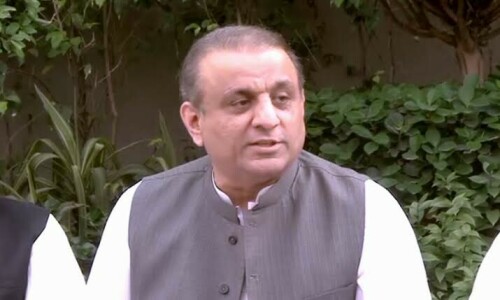
PESHAWAR: “I can neither play nor go to school,” says 18-year-old Misal Khan, who looks like a five-year-old child as he has been suffering from thalassaemia since he was just one-month-old.
The anaemic but smiling child hardly spoke these lines and he was short of breath. Sitting close to him was his sister Javeria, only eight. She has also been also suffering from thalassaemia since she was only two-month-old.
Both the siblings are regular visitors to a welfare blood transfusion centre and hospital.
Misal Khan’s mother said that two out of her six children were suffering from the disease. She said she was very sad in the beginning when she saw her children suffering from a disease for which treatment was not an easily available facility.
She said she had to come for blood transfusions quite frequently and each visit cost her about Rs4,000.
Another mother sitting with her son, who was lying on bed as blood transfusion was in progress, wondered if there was a treatment available for her son to fully recover from the disease as she had lost two sons. She said after her husband’s death, she had no one but her minor son and he had thalassaemia.
A number of pale-faced innocent children were lying on beds getting blood transfusion. Their mothers waited bedside their beds, praying for their children. Each drop of blood was instilling life in their children. The scene could melt anyone with a heart.
However, it is unfortunate that treatment facilities at public sector hospitals where the poor people can take their sick children are almost next to nothing.
Ijaz Ali, executive member of Thalassaemia Federation of Pakistan, who also founded a welfare hospital and blood services facility for such patients in Peshawar, said that there were about three such private hospitals that had registered about 20,000 thalassaemia patients (children) and the number could be high.
He said that the sad thing was that around 6,000 children having thalassaemia were born in Pakistan each year and about eight per cent of them were born in Khyber Pakhtunkhwa.
Mr Ali said that it was alarming that number of such patients was higher in Khyber Pakhtunkhwa than other provinces as cousin marriages were common and carrier of the disease gave birth to children with thalasaemia disease. He said that awareness was very important to put brake on the disease.
Even on World Thalassaemia Day, there was no awareness campaign or any such activity in the provincial capital or other areas of the province.
In 2010, the provincial assembly passed a law to make premarital tests mandatory to spread health awareness and educate future parents that may give birth to children with contagious and fatal diseases.
According to the bill, introduced by Awami National Party lawmaker Saqibullah Khan Chamkani, a nikah registrar shall obtain test reports of spouses regarding thalassaemia and hepatitis-C before solemnisation of the marriage. “However, government has not taken any step to implement this law,” said Mr Ali.
The premarital tests should be conducted free of cost so that people could be encouraged to go for it. “It would save them from agony of a lifetime of seeing their children dying slowly with thalasaemia,” said renowned artist Ajab Gul, who had come to show support to the mothers and their children on World Thalassaemia Day.
He said that government should spread awareness among the people about prevention of the disease and set up treatment facilities for the sick children.
Zainab, who was holding her little daughter Brekhna in her arms, said neither she nor her husband suffered from the disease.
They were not even related or cousins but they were carriers of the disease and now they feel sorry when they see their little daughter suffers.
“When she feels pain in the belly she insists on going for blood transfusion. In her childhood she has learnt how important blood is for her,” Zainab said.
Mr Ali said that it was pathetic that government was running a thalassaemia preventive programme with enough funds and facilities but they had not launched sufficient awareness campaigns.
He also lamented that there was no separate ward in public hospitals for thalassaemia patients. He said that there should be separate wards and treatment facilities for thalassaemia patients, mostly children, and mass awareness campaigns should be launched to educate people about prevention of the disease.














































Dear visitor, the comments section is undergoing an overhaul and will return soon.